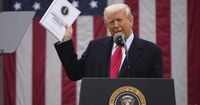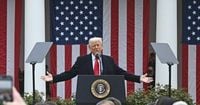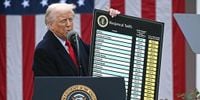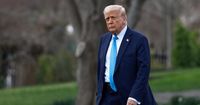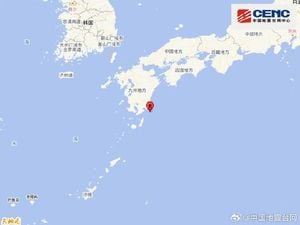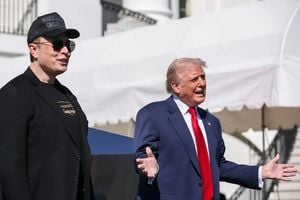On Wednesday, April 2, 2025, President Donald Trump made headlines with a bold announcement regarding new "reciprocal tariffs" that will significantly affect international trade. These tariffs include a staggering 34% on products imported from China and 20% on those from the European Union. This move marks a dramatic shift in U.S. trade policy, as Trump aims to address what he describes as decades of economic exploitation by foreign nations.
During a ceremony in the Rose Garden of the White House, Trump proclaimed this day as the "Liberation Day" for American workers and businesses. He stated, "Our country has been plundered, ravaged, violated, and devastated by nations near and far, allies as well as enemies." This rhetoric underscores his administration's commitment to a more protectionist trade stance, a departure from the free trade principles that have guided U.S. policy for decades.
The new tariffs will come into effect in two phases: a 10% floor tariff on all imports will start on April 5, 2025, at 4:01 GMT, while the increased tariffs targeting specific countries, including the EU and China, will take effect on April 9, 2025, at the same time. In addition to the 34% tariff on Chinese goods, products from Japan will face a 24% tariff, while those from India will be taxed at 26%. Vietnam will see a hefty 46% tariff, and the UK will be subject to a 10% tax.
Trump's decision to impose these tariffs is part of a broader strategy to rectify what he perceives as unfair trade practices that have led to a $1.2 trillion trade deficit for the U.S. in 2024. He emphasized that the tariffs are not just a punitive measure but a necessary step toward achieving economic independence. "Reciprocal means: what they do to us, we do to them. It’s very simple, it couldn’t be simpler," he explained.
Critics of Trump's tariff plan, including Senate Democratic leader Chuck Schumer, have labeled it an "absurd, chaotic trade war" that could cost the average American household over $6,000 annually due to rising prices on imported goods. Schumer's concerns echo a broader apprehension about the potential for inflation and economic downturn as a result of these new measures.
As the announcement reverberated across the globe, various nations began to react. The European Union has vowed to retaliate against the U.S. tariffs, with plans to implement countermeasures by the end of April. A spokesperson for the French government stated that the EU would respond "before the end of April," signaling a potential escalation in trade tensions.
Meanwhile, Canada and Mexico, which are part of the United States-Mexico-Canada Agreement (USMCA), were notably absent from the tariff list, indicating that they will not face the same punitive measures. A senior U.S. official clarified that these countries operate under a different regime due to their existing trade agreements with the U.S.
Trump's tariffs also mark the end of an exemption that allowed small packages sent from China to enter the U.S. duty-free, a change that could significantly impact Chinese e-commerce giants like Shein and Temu that have benefited from this loophole. The economic implications of these tariffs are far-reaching, and experts warn that they could lead to a global economic slowdown.
Economist Maurice Obstfeld from the Peterson Institute for International Economics (PIIE) described the tariffs as "a declaration of war on the global economy," predicting that they will be "absolutely crushing" for many countries. This sentiment was echoed by financial markets, which reacted negatively to the news, with global stock indices showing signs of strain.
In the wake of Trump's announcement, the dollar slipped against the euro, losing over 1% of its value. This decline reflects investor concerns about the potential impact of the tariffs on the U.S. economy, as well as fears of a trade war that could disrupt global supply chains.
Despite the backlash, Trump remains steadfast in his belief that these tariffs will lead to a resurgence of American manufacturing and a return to an "American golden age." He has repeatedly asserted that the U.S. has been taken advantage of for too long and that it is time to reclaim economic sovereignty.
However, the reality is that the implementation of such tariffs could lead to a cascade of retaliatory measures from affected countries, further complicating the global trade landscape. Countries like Canada have already begun to impose their own tariffs on U.S. goods, including a 25% tax on steel and aluminum imports.
As the situation develops, it remains to be seen how the global economy will adapt to these changes. The potential for a trade war looms large, and many are left wondering whether these tariffs will indeed lead to the promised economic revival or if they will trigger a recession.
In conclusion, President Trump's announcement of reciprocal tariffs marks a significant pivot in U.S. trade policy, with far-reaching implications for both domestic and international markets. As nations brace for the impact of these tariffs, the world watches closely to see how this bold move will unfold in the coming weeks and months.
